Special ReportBehind CUNY graduation speech furor, a university divided over Zionism
Fatima Mousa Mohammed’s fiery graduation address is the latest chapter in a complicated story about Zionism, antisemitism and free speech at one of New York City’s most important universities
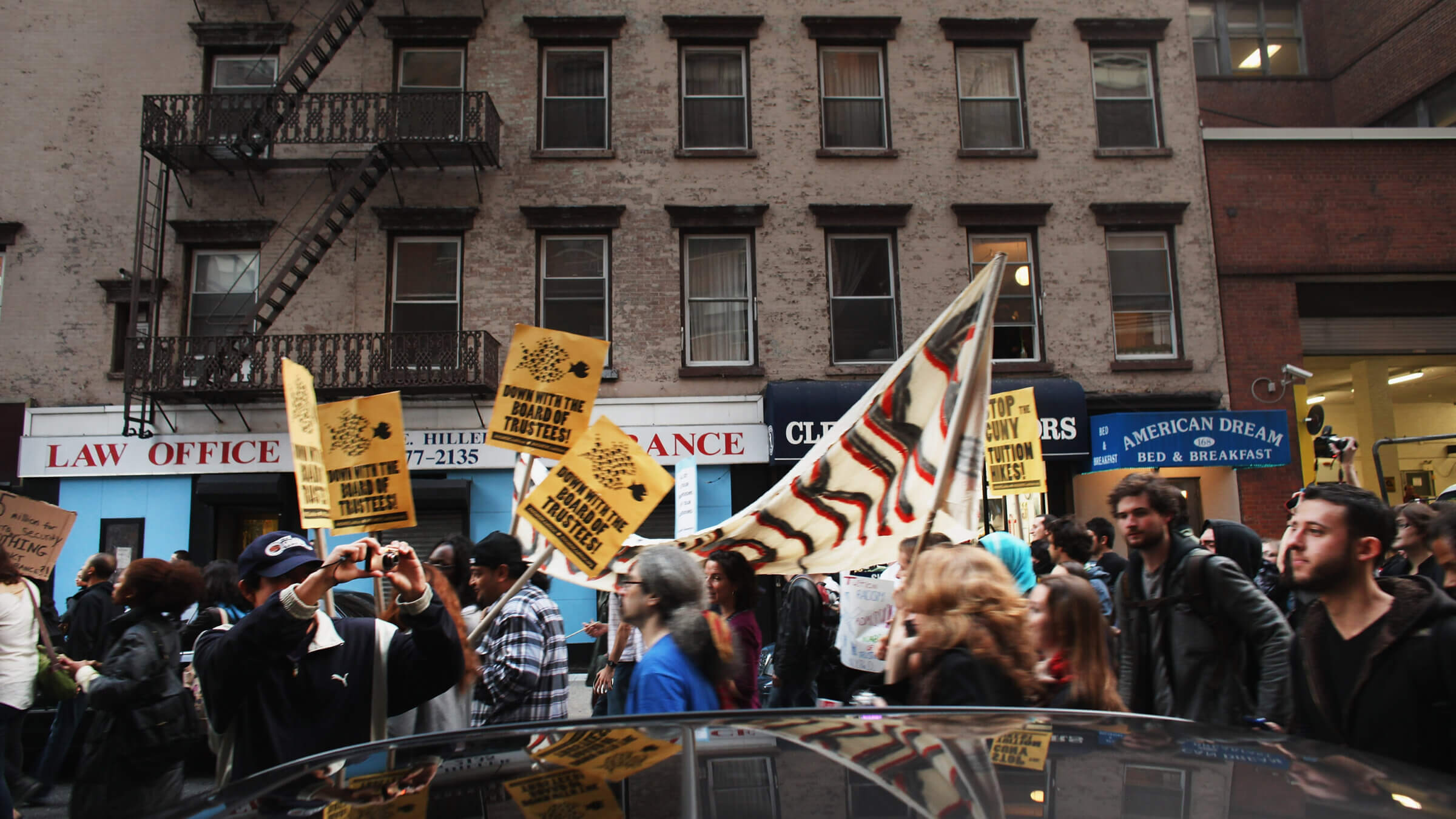
Campus controversies over Israel, including the one sparked by Fatima Mohammed’s commencement address this May, are hardly unique to the City University of New York. But they often play out with a special intensity at the institution, which has long drawn politically-minded students and faculty, like those seen above demonstrating against tuition increases in 2011. Photo by Getty Images
As third-year students at the City University of New York’s law school finished up their coursework this past April, the administration sent around a poll soliciting nominations for the commencement speaker. There was no campaigning, but Fatima Mousa Mohammed prevailed after two rounds of voting.
Mohammed, a first-generation immigrant from Yemen, was given just a few days to submit a rough draft of her remarks to the dean’s office for approval. The process overlapped with Eid al-Fitr, the holiday marking the end of Ramadan, and Mohammed juggled writing her speech with family celebrations. The final product came together in a few hours.
“I never anticipated it getting this much attention — maybe I would have spent more time writing it,” Mohammed said during an extended phone interview this week. “I honestly just wrote what was on my mind and what was in my heart.”
While the 24-year-old Mohammed received some nasty messages on social media immediately following the commencement, she didn’t realize the extent of the backlash until two weeks after her May 12 speech when a New York Post reporter came to her door. “I was like, ‘OK, what?” The answer would come a couple of days later when she saw her face plastered on the Post’s front page: “Stark raving grad,” read the headline.
Her speech — and especially her comments accusing Israel of indiscriminate murder — ultimately brought a firestorm of criticism from local and national politicians, including New York City Mayor Eric Adams and Republican Sen. Ted Cruz. There were calls from Democrats and Republicans to strip CUNY of its public funding. Mohammed would be labeled a “rabid antisemite,” by a group founded to fight antisemitism. And even the liberal Nation magazine accused her of “borderline racism” and claimed that she had invoked tropes straight out of the Protocols of the Elders of Zion, a notorious antisemitic tract.
For those who have not followed the turmoil at CUNY in recent years, Mohammed’s remarks may have seemed shocking. She condemned Israel for “murdering the old, the young, attacking even funerals and graveyards as it encourages lynch mobs to target Palestinian homes and businesses.”
Campus conflicts related to Israel are not unique to CUNY. But they often play out with a special intensity at the school.
The harsh rhetoric wasn’t reserved for Israel, though. The future lawyer also went after the law itself as a “manifestation of white supremacy.” And speaking after Adams, a former cop, addressed the audience, Mohammed called the city’s police force “fascist,” and said that “brown and Black men are being murdered by the state at Rikers.” She called the university’s central administration “racist.” And praising her fellow graduates, said she was confident that they would not help write “intellectual property contracts to secure designs for the newest drone technology murdering children.”
Yet these kinds of messages, perhaps alarming to Post readers, were not unexpected by the graduating class of CUNY School of Law, which prides itself on radical politics and has become a hotbed of Palestinian activism in recent years.
“Mainstream media is attempting to paint me as a lone wolf — like an isolated person who just took the mic and went rogue,” Mohammed told me during our interview, one of the first she has granted since the video of her speech went viral. “But that is very divorced from the reality.”
The reality she speaks of includes a campus sympathetic to her worldview. The dean’s office approved her speech before she gave it, and the substance of her remarks is standard fare at campus rallies. Many of Mohammed’s allies were surprised by the backlash she faced, including a board of trustees statement denouncing her remarks as “hate speech.” It seemed simply the latest effort to squash support for Palestinians across the sprawling CUNY system.
Please read the full statement from the CUNY Board of Trustees and @ChancellorCUNY. https://t.co/TBpNCdlFRa pic.twitter.com/pshnGzUE6b
— The City University of New York (@CUNY) May 30, 2023
“Fatima’s speech was pretty standard,” said Amal Thabateh, an attorney at Palestine Legal who graduated from CUNY Law two years ago. “A lot of student groups and speakers and advocates have given the same kind of talk.”
CUNY’s law school has been a center of anti-Zionist organizing for years, and Nerdeen Kiswani, another prominent activist, delivered a similar commencement address last year.
But the law school is only one part of CUNY, which enrolls 260,000 students across 25 campuses. As the reaction to Mohammed’s remarks shocked many who graduated with her, the words themselves stung some members of the larger community, for whom they sounded discriminatory and even dangerous. Jeffrey Lax, a professor at Kingsborough Community College, saw her speech as an escalation in what he perceives to be an ongoing drive to push Zionists — itself a contested term — out of the nation’s largest urban public university.
“When you allow a Nerdeen Kiswani speech to happen, the next thing is a Fatima Mohammed speech,” said Lax, who runs a pro-Israel organization at the school. “She didn’t call for ‘revolution’ and ‘rage’ against Israelis — she’s talking about me and the many thousands of Zionist Jews at CUNY.”
The conflict over speech related to Israel on college campuses is not unique to CUNY. But it often plays out with a special intensity at the school, which is located in a media-saturated metropolis that is home to many Jewish and Arab Americans, two constituencies deeply invested in Middle Eastern politics. And Mohammed is emblematic of a new generation of New Yorker, antiestablishment and outspoken, and committed to the Palestinian cause. CUNY, and especially its law school, has become a natural landing spot for many who share her beliefs.
A ‘revolutionary’ law school
The City University of New York, with campuses in the city’s five boroughs, was once a stronghold of working-class Jewish students shut out of many universities by antisemitic quotas. Yarmulkes and Star of David pendants are still a common sight at schools like Brooklyn College, which offers a Biblical Hebrew course popular with observant Jewish students. But as the demographics of both the city and its Jewish community have changed, CUNY has become home to many students like Mohammed who, as she put it in her commencement speech, came “from the rich soil of Yemen, raised by the humble streets of Queens.”
The third of eight siblings, Mohammed immigrated to the United States when she was 6 months old, and made her way through the public school system. As a junior in high school she started taking college courses, allowing her to earn a bachelor’s degree from John Jay College of Criminal Justice, part of the CUNY system, in just two years. Mohammed was the first in her family to graduate from college.
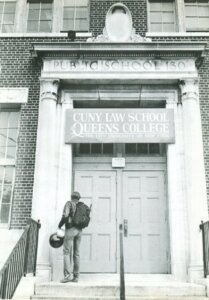
Her political awakening came as an undergrad when former President Donald Trump signed the executive order banning immigrants and visitors from several predominantly Muslim countries, including Yemen. “That’s where I started to really reckon with my identity as a Muslim woman, not only a Muslim woman but an Arab woman, and not only as an Arab woman but as someone from Yemen,” she said. “That’s when I started to really understand my position here in this country.”
Mohammed was drawn to CUNY School of Law’s approach to legal education. The school opened 40 years ago in a vacant elementary school with toilets sized for young children and the law library located in the cafeteria. It was founded with a strong emphasis on “law in the service of human needs,” as the school’s motto states, and is consistently listed at the top of national rankings for public interest law and clinical education.
That attitude has extended, in recent years, to the Israeli-Palestinian conflict. The Jewish Law Students Association, the institution’s only Jewish student group, is avowedly anti-Zionist, and last year the school’s faculty followed its student association in endorsing a boycott of Israel — an apparent first for a law school. When Mohammed submitted a rough draft and audio recording of her commencement address, including the criticism of Israel, to the dean’s office for approval, the only feedback she said she received was to speak more slowly.
“CUNY Law has a reputation for being a place that’s for leaders of revolutionary movements, for revolutionary thinkers, for people who are inspired by joining larger movements for liberation,” Mohammed said.
(While CUNY’s central administration has condemned Mohammed’s speech, CUNY Law’s leadership has not issued any statements about the commencement and did not respond to a request for comment.)
Rachel Pincus, the outgoing chair of the Jewish Law Students Association at CUNY, said Mohammed leaned into the law school’s progressive nature, often speaking up about injustice during class discussions on legal doctrine. Pincus worked with Mohammed at CUNY Law’s clinic supporting New Yorkers targeted by government counterterrorism work, including people barred from traveling by law enforcement.
“She’s really good at grounding the practice that we do in that clinic in how it actually affects herself and her community and her family,” Pincus said.
A university embroiled in controversy
The New York Post has written more than a dozen articles about Mohammed’s speech since May, and the story has been widely covered by other conservative outlets like Fox News and the National Review. Mohammed was listed on Canary Mission, which runs a blacklist of activists who target Israel, and named “antisemite of the week” by StopAntisemitism, the group that also called her “rabid,” while a pro-Israel legal organization has asked the New York Bar to block her admission. HonestReporting, a conservative media watchdog, published a photo of Mohammed engulfed in flames.
But much of the criticism that followed the commencement has focused on CUNY itself.
“I hold the institution and the faculty members of the law school much more responsible for this outrageous speech than I do the student,” said Lax, who runs the group Students and Faculty for Equality at CUNY. “When I was a student I was an idiot and I made a lot of mistakes and my professors taught me the things I was looking at in the wrong way.”
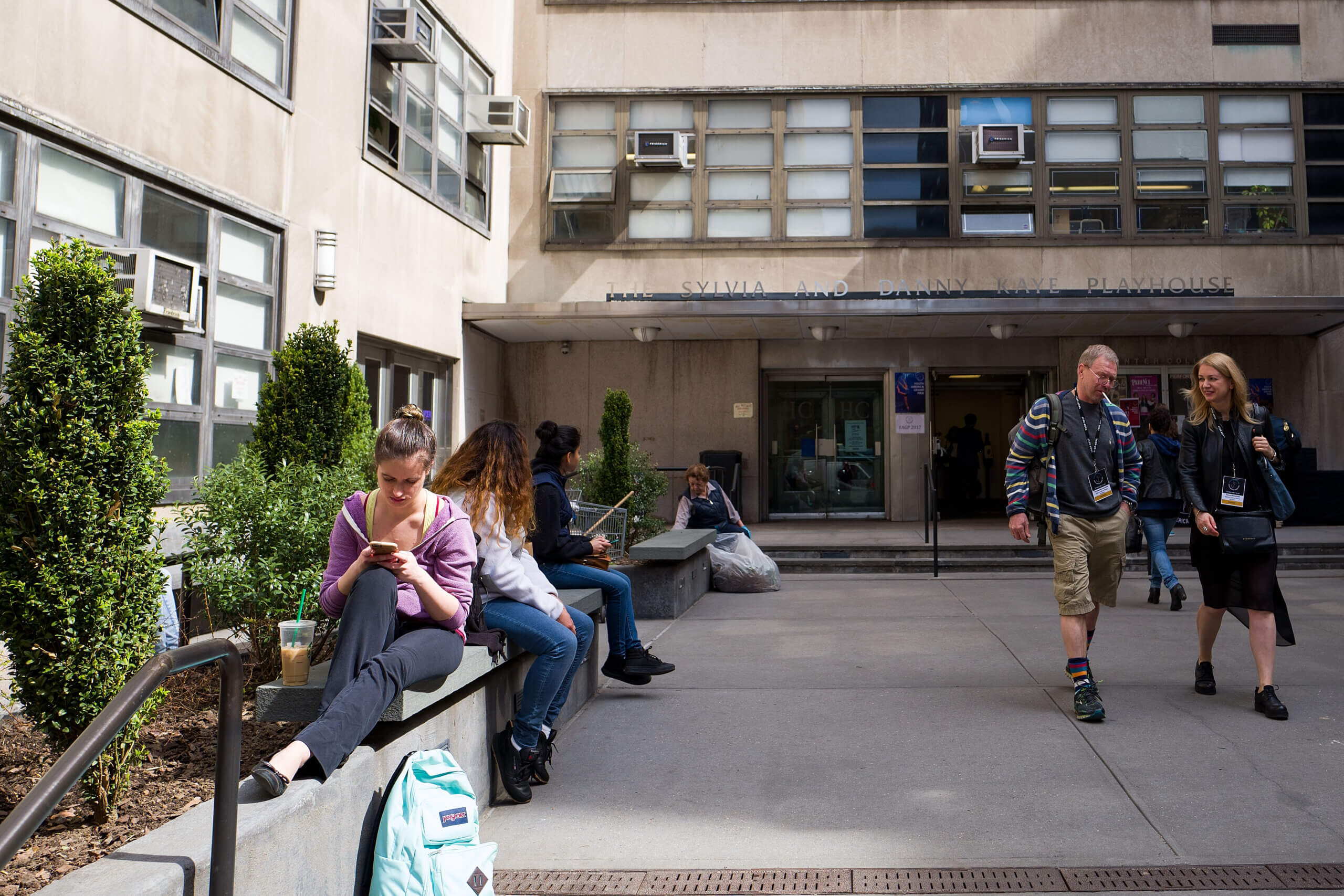
For the last few years, the school has been embroiled in controversy over allegations that it is rife with antisemitism. These claims are common at schools across the country, and almost always geared around concerns over activism related to Israel. But they have been especially pronounced at CUNY.
At least three lawsuits and federal civil rights complaints have been filed against CUNY for discrimination against Jewish students and faculty, and the New York City Council convened a hearing last summer about allegations of antisemitism in higher education at which several officials demanded that it adopt a controversial definition of antisemitism that includes anti-Zionism. The faculty union started losing members after it passed a resolution two years ago accusing Israel of a “massacre” against Palestinians. The National Right to Work Foundation, which is opposed to unions, has taken to referring to the Professional Staff Congress as an “antisemitism-linked union.” The Post has also helped fuel the narrative that there’s a crisis at the school, publishing an opinion piece by Lax in April titled, “How CUNY became America’s most antisemitic university.”
Mohammed views the furor directed at her as part of this larger trend, which she and other students involved in Palestinian activism on campus believe is intended to silence them.
“It’s crucial that we contextualize the smear campaign I was subjected to not as an individual viral sensation,” Mohammed said. “It’s part and parcel of a very deliberate campaign that seeks to punish the recent wins in terms of Palestinian advocacy on campus.”
Varied perceptions of antisemitism
While a dedicated core of activists on campus believe that Palestinian activism on campus is often a thin veil for antisemitism, other Jewish students and faculty take a more sanguine view of rhetoric around Israel that they acknowledge can sometimes feel uncomfortable.
It can be hard to pin down the experience of Jews at CUNY because the institution’s campuses are so different and tend to be disconnected from one another. CUNY Law occupies the lower floors of a gleaming office tower in the Long Island City neighborhood of Queens and enrolls 700 students, a small and decidedly more political faction of the university system, which includes five campuses on Hillel’s list of public universities with the most Jewish students.
When StandWithUs, a pro-Israel group, filed a complaint against Hunter College in Manhattan two years ago, alleging that the school tolerated an antisemitic environment in its school of social work, many students were skeptical. “As a Jewish person I’m not discriminated against,” Jennie Reich Litzky, the Hillel student president at the time, told JTA.
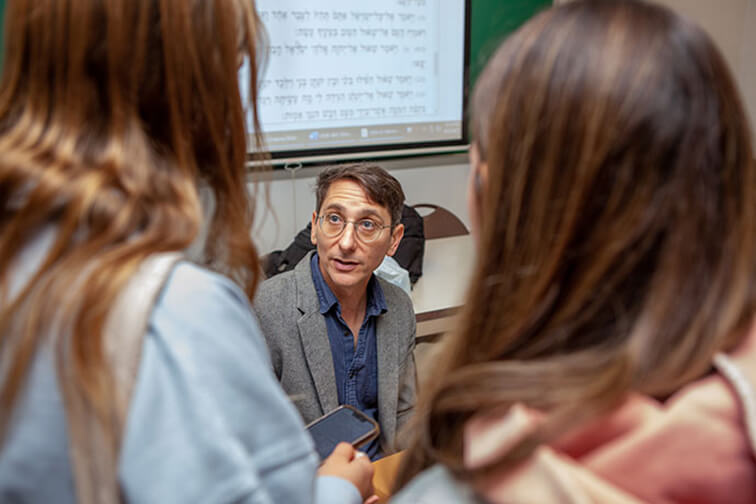
Brooklyn College has the most Jewish students in the CUNY system at 4,500, according to Hillel, making up nearly 30% of undergraduate enrollment. The school organized a campus tour for me last fall, including a visit to the Biblical Hebrew class, intended to show the thriving Jewish life on campus. The classroom was packed with students, many of them observant Jews, who appeared engaged by the lesson from David Brodsky, a youthful professor who previously taught at the Reconstructionist Rabbinical College and wore a black yarmulke.
Brodsky, drinking out of a Zabar’s mug, was clearly ambivalent about being included on the tour. He opened the class with a soliloquy intended for me and the college spokesperson who had arranged the visit. “They like to advertise that we have a vibrant Jewish community — which we do — and a whole array of Jewish studies,” he said. “But yesterday they told me I basically have to cut all of our Hebrew and Yiddish classes despite the fact they’re doing as well as any of our other classes.”
(Reached by phone this week, Brodsky said he didn’t “want to cast aspersions unnecessarily,” and that the pressure to reduce the number of courses was not motivated by antisemitism. A Brooklyn College spokesperson said they continue to offer a variety of Hebrew classes, although a Yiddish course was canceled due to insufficient enrollment.)
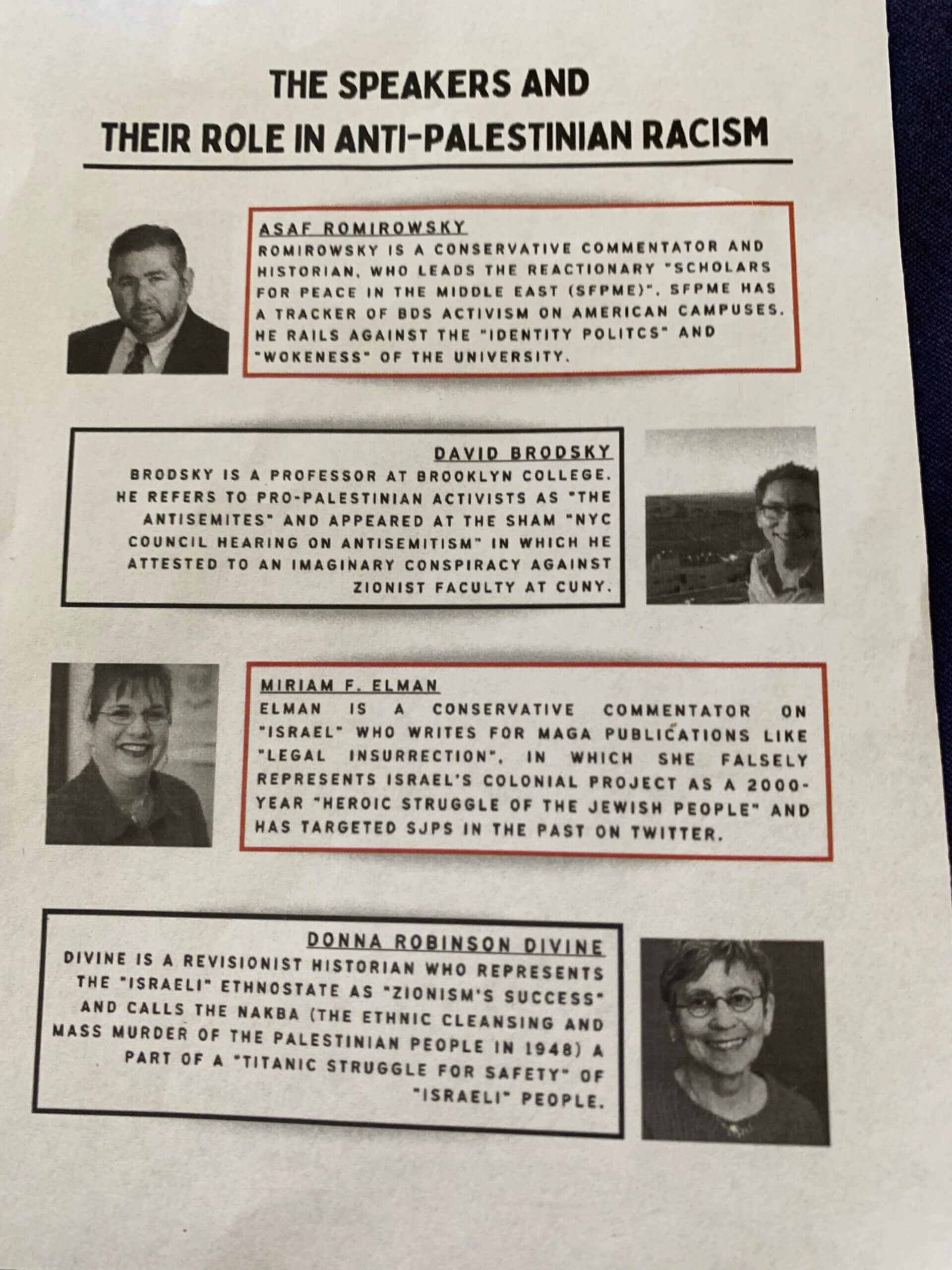
Brodsky also testified at the New York City Council hearing on antisemitism at CUNY last summer that was boycotted by some progressives who believed it was intended to smear Palestinians.
Several months after the hearing, protesters who objected to a panel about the Israeli-Palestinian conflict that Brodsky was speaking on distributed a flyer on campus that accused him of promoting “anti-Palestinian racism,” and said he had described “an imaginary conspiracy against Zionist faculty at CUNY.” Brodsky strenuously denied the allegations, and said the flyer was an example of the kind of harassment faced by those at CUNY who are perceived as too friendly toward Israel.
Across the street from campus Brooklyn College’s Tanger Hillel was buzzing in October with Jewish students enjoying lunch in the kosher cafeteria and participating in a blood drive. Director Nadya Drukker said that Jews on campus weren’t immune from increased antisemitism in the city, but that things were much better than they a decade ago when disputes over Israel boiled over more regularly.
CUNY’s location in New York City and the fact that most of its campuses are commuter schools means that there’s often a thin line between activism on and off campus. Sometimes the most disturbing incidents for students are instigated by people who aren’t affiliated with the university not to mention the national advocacy groups that insert themselves into campus debates over Israel.
“Often it’s not the students that are creating this negative environment,” Drukker said. “It’s people and organizations from the outside that are creating tensions.”
Maia Rosenberg, who graduated from Brooklyn College last year with a degree in linguistics, said the school’s administrative staff sometimes expressed antisemitism, including snide comments about how it was difficult to file paperwork on time because “the Jews never show up on Friday.” Once, a clerk stopped short after reading her name on a form and asked her if she was Jewish.
“She proceeded to dig a deeper hole by saying, ‘Oh, well you don’t look like one,’” Rosenberg recalled in an interview that took place before the controversy about Mohammed’s speech. “I remember thinking to myself on all these occasions: You work at Brooklyn College and you don’t like Jews? It just seemed odd.”
Rosenberg said discussions about Israel, where her mother was born, were fraught in a different way. She had trouble relating to right-wing students who fawned over her Israeli background, while progressives who learned she had Israeli citizenship during a class discussion sometimes wanted to test her politics. “It’s almost always the immediate demand that like, ‘You’re not a Zionist right? Prove to me you’re not a Zionist,’” she said.
But she said these encounters were with random classmates, and that she had not experienced harassment from the organized Palestinian advocacy groups on campus. Rosenberg, a member of Jews for Racial and Economic Justice, which has lobbied on the issue, balked at the way some New York City politicians seemed to focus on antisemitism at the school in order to shut down activism.
“When you are able to weaponize Zionism or anti-BDS panic it ends up serving the same purpose of being able to silence people,” she said.
School leadership in the crossfire
The CUNY administration has taken the allegations of antisemitism related to Mohammed’s speech and other incidents seriously. Under Chancellor Felix Matos Rodriguez, who oversees the university, CUNY has partnered with Hillel and the Foundation to Combat Anti-Semitism, created a new advisory council on Jewish life, and is expanding its exchange programs in Israel. Last spring, Rodriguez led a trip to Israel for the university’s college presidents and deans.
Yet some of the institution’s responses to concerns about antisemitism have landed the school in more hot water with critics who believe it’s hostile to Israel, as when the school assigned its chief diversity officer, Saly Abd Alla, to look into claims of anti-Zionist discrimination. Right-wing groups assailed Alla for her past work on behalf of the Council on American-Islamic Relations, which supports a boycott of Israel. “Was David Duke or Farrakhan not available?” StopAntisemitism asked on Twitter. The school pulled Abd Alla from the investigation.
Rodriguez also adopted the International Holocaust Remembrance Alliance’s definition of antisemitism, which has been assailed by progressives as a tool for cracking down on activism targeting Israel last fall, although the school has insisted that it will only be used as an “educational resource.”

The maneuvering has appeased some of the more staid stakeholders like the Jewish Community Relations Council of New York, which has worked on Israel trips with Rodriguez. But activist groups have remained frustrated with the administration. Alums for Campus Fairness, a pro-Israel group ran an advertising campaign plastering Rodriguez’s face in local newspapers last fall.
“Jewish CUNY students are not safe at CUNY,” read the ads. “The chancellor is doing nothing about it.”
Rodriguez’s insistence that the IHRA definition is only meant to serve as a tool and not official school policy has not calmed voices to his left. The Jewish Law Students Association has been running an #IHRAOutOfCUNY campaign, arguing that the IHRA definition is “used to smear Palestinian, Arab, Muslim, and Jewish students.”
Some allegations of antisemitism at CUNY have little or nothing to do with Israel, like a federal complaint accepted by the federal Education Department last year that described harassment against Jewish students at Brooklyn College’s mental health master’s program. But much of it is focused on claims that the kind of hostility toward Israel that Mohammed displayed in her commencement address is itself the problem at CUNY.
Drukker, the Hillel director, said rhetoric aimed at Israel and Zionism makes some Jewish students feel uncomfortable.
“‘Zionists off CUNY, ‘Zionists don’t belong here, ‘IDF off campus,’” Drukker said, giving examples of slogans she’s heard on campus. “Even though it’s not explicitly ‘Jews,’ they feel like it is very much against them.”
Mohammed is adamant that her speech was not aimed at Jews.
“It’s a really dangerous thing to sort of conflate antisemitism and anti-Zionism because those are two distinct things,” she said. “Ultimately it serves as a way to chill activism for Palestine.”
Differing views of ‘Zionist’
After the controversy over her speech erupted, several organizations circulated social media posts that they attributed to Mohammed. One of the most widely shared was a Twitter post from May 2021 during the outbreak of violence in Israel and Gaza.
“Terms like left-wing Israeli just make me laugh,” the post stated. “May every Zionist burn in the hottest pit of hell.”
Mohammed said that, for her own sanity, she had not looked at all the negative publicity directed at her online or verified whether she wrote every post attributed to her. But she said it was unfortunate that people had pored over a college student’s anonymous social media accounts in order to expose her to “hate and harassment.”
“And for what? For speaking for Palestinian liberation,” she said. “If folks don’t agree with the tone, or don’t agree with the wording of what I’m saying, that is up to them.”
The use of the term “Zionist” is one of the most fraught in controversies over the Israeli-Palestinian conflict. There is no reliable polling on how many Jews consider themselves to be Zionists, and sociologists typically say that is because there is no common understanding of what the word means.
Lax, example, said his Zionism was “purely religious,” so when people criticize Zionists he feels it as an attack on his faith rather than on his political beliefs. Brodsky said that although he’s never adopted the label, he had family members who became Zionists after surviving the Holocaust and immigrating to Israel. “I’m not going to call them white supremacists and racists,” he said. “And I take umbrage when that’s the only narrative people have.”

I asked Mohammed who “Zionists” were in her view. Did the term cover anyone with an emotional attachment to Israel who did not identify as an anti-Zionist, like the liberal Zionists at J Street, or was it limited to those who defended the country’s treatment of Palestinians?
“It’s who supports this ideology — materially — who is actively supporting the dispossession and the violence against Palestinians,” she said. “Those are Zionists.”
Mohammed added that her understanding was that most American Zionists were evangelical Christians, not Jews, and noted the long history of Jewish opposition to Zionism. But she hasn’t spent much time thinking about the different types of Jewish attachment to Israel. “When I’m speaking up, I’m speaking with the Palestinian people at the forefront of my mind — with the oppressed and colonized people at the forefront of my mind,” she said.
That was the same guiding principle that applied to her views on a political solution to the Israeli-Palestinian conflict. Alexis Grenell wondered aloud in a column for The Nation titled, “Does Fatima Mousa Mohammed Oppose Israel’s Very Existence?”
Mohammed told me she didn’t think a two-state solution — one Israeli, one Palestinian — was possible, or that it was what the Palestinians wanted. Beyond that, she didn’t have a position on what shape a future state in the region should look like.
“Zionism is indefensible and it cannot coexist in the reality of a Palestinian people living free from apartheid and colonial oppression,” she said. “We have to respect what the Palestinian people desire because ultimately this is their land and they have the right to their land.”
Are Zionists being pushed out — or anti-Zionists?
Brodsky, the professor, said that he believed Jewish enrollment was falling at Brooklyn College due in part to hostility toward Zionism. He said this was as much about perception as reality, with negative media coverage convincing Jewish parents that the school might not be safe for their children. But he added that there were real problems, too.
“It’s not, like, unsafe for Jews on campus,” he said. “It’s that Jews have to deal with the fact that they will hear negative things about Israel that cross the line into classic antisemitic rhetoric.”
Pincus, the Jewish law student group leader, said that she had a hard time imagining a future in which the CUNY system did not remain home to many Zionist Jews. Even the Jewish Law Students Association, which makes every new member acknowledge that they have read its anti-Zionist constitution, has Zionist members.
The point was to push out political organizing that supported oppressive Israeli policies, she said, not to ban anyone who identified as a Zionist from the institution.
“Zionist Jews are welcome, and Zionism is welcome, all over CUNY,” Pincus said, adding a future in which there were no Zionists in the system’s law school was not a goal for her. “There is a part of me that just can’t really imagine what it would look like to not have that — so it’s definitely not a vision of success for me personally.”
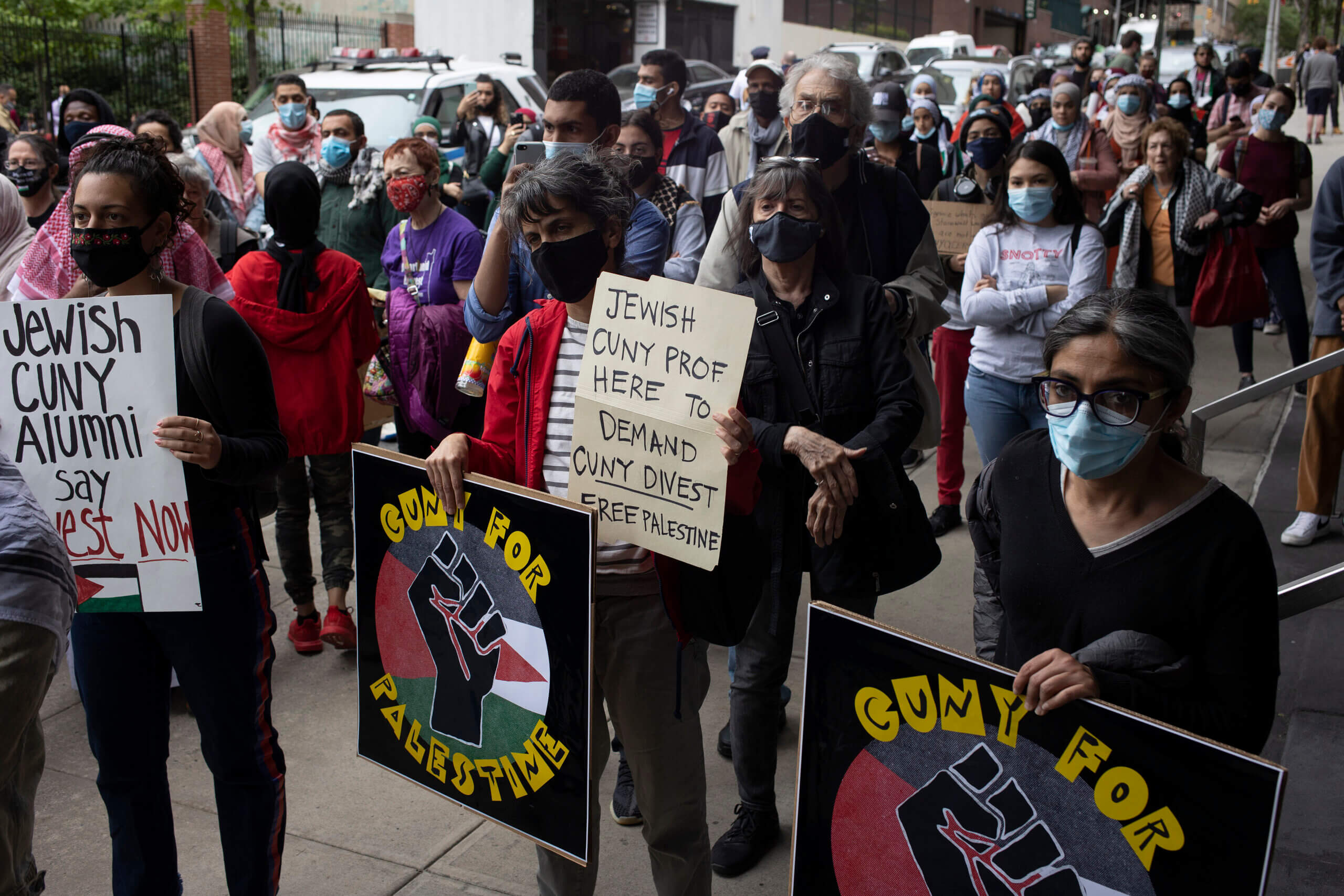
In fact, Pincus has the opposite concern.
“It’s way more realistic for us to fear a checkbox that says, ‘Do you have a relationship to Palestine organizing?’” Pincus said. If the school accepts that anti-Zionism is a form of antisemitism, Pincus worries that activists like her could be disciplined for discrimination and ultimately screened out of the school.
Mohammed, who said the media firestorm had set back her preparation for the bar exam by several weeks and is now spending 10-hour days cramming for the test, has been heartened by the support from a coalition of 14 left-wing civil rights groups, including Palestine Legal, the Center for Constitutional Rights and the National Lawyers Guild, that has called on the board of trustees to retract their statement describing her address as hate speech. She was also glad to read about the California community college graduate who said Mohammed’s remarks inspired her to talk about Israel at her own commencement.
“The Zionist lobby — despite the millions and millions it invests in violence to maintain the oppression of Palestinians — is unable to silence us,” she said. “It’s reckoning with a new reality.”
But she’s still not sure what the future will hold. Mohammed said that, despite her activism, she had been a relatively private person before the controversy unfolded. Her limited social media presence was a running joke among her friends, and she noted that news outlets had to pull her headshot from LinkedIn because that was the only platform where she posted a photo. That level of privacy no longer feels possible. The other day, a friend in Manhattan saw a billboard truck driving with a photo of her face alongside Kiswani and Rodriguez, the CUNY chancellor, all slashed through with Xs.
“I’m always around the city and so for there to be such an active threat to my safety in places that I felt so comfortable — that’s a very unpleasant place to be,” she said. “But I know that it’s a passing storm and, you know, I have no regrets.”
Listen to That Jewish News Show, a smart and thoughtful look at the week in Jewish news from the journalists at the Forward, now available on Apple and Spotify:















